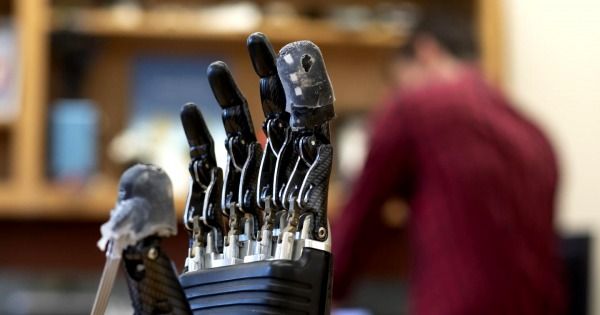Jun 21, 2018
This Table Saw Could Save Your Fingers From Getting Amputated
Posted by Nicholi Avery in category: futurism
Sawed-off fingers are a thing of the past with this technology. Here’s how SawStop does it. (via @ Seeker)

Sawed-off fingers are a thing of the past with this technology. Here’s how SawStop does it. (via @ Seeker)

I felt my hand, as if a hollow shell, got filled with life again.”
Researchers have created e-dermis, an electronic skin that transmits sensations of pain from an amputee’s prosthetic hand to their brain.
Researchers tissue-engineered human pancreatic islets in a laboratory that develop a circulatory system, secrete hormones like insulin and successfully treat sudden-onset type 1 diabetes in transplanted mice.
In a study published by Cell Reports, the scientists use a new bioengineering process they developed called a self-condensation cell culture. The technology helps nudge medical science closer to one day growing human organ tissues from a person’s own cells for regenerative therapy, say study investigators at Cincinnati Children’s Hospital Medical Center in the U.S. and Yokohama City University (YCU) in Japan.
“This method may serve as a principal curative strategy for treating type 1 diabetes, of which there are 79,000 new diagnoses per year,” said Takanori Takebe, MD, a physician-scientist at the Cincinnati Children’s Center for Stem Cell and Organoid Medicine. “This is a life-threatening disease that never goes away, so developing effective and possibly permanent therapeutic approaches would help millions of children and adults around the world.”
Continue reading “Tissue-engineered human pancreatic cells successfully treat diabetic mice” »
Compared with brain organoids grown from ordinary human cells (top), those with a Neanderthal gene variant (bottom) differ in appearance and behavior.
Aside from dark matter and the dark energy that comprised the universe, there remained to be 5 percent of what was called the “ordinary matter.” About two-thirds of this ordinary matter was left unaccounted for until now. ( Harvard-Smithsonian Center for Astrophysics )
After a 20-year-long experiment, a team of international scientists detects the last of the missing intergalactic material predicted to be created by the Big Bang.
Specifically, the team was finally able to detect the missing parts of the “ordinary matter” that makes up everything in the universe, from the stars to the cores of black holes. This ordinary matter is different from the “dark matter” that comprised the bulk of the universe’s mass. The dark matter remained to be undetected until now.
Continue reading “Scientists Detect Possible Missing ‘Piece’ Of Universe Created By The Big Bang” »
It seems that Microsoft isn’t done experimenting with blockchain technology.
Microsoft and Ernst & Young (EY) announced the launch of a blockchain solution for content rights and royalties management on Wednesday.
The blockchain solution is first implemented for Microsoft’s game publisher partners. Indeed, gaming giant Ubisoft is already experimenting with the technology.
Continue reading “Microsoft launches ambitious blockchain project to help creators get paid” »
Infrared cameras are the heat-sensing eyes that help drones find their targets, even in the dead of night or through heavy fog.
Hiding from such detectors could become much easier, thanks to a new cloaking material that renders objects—and people—practically invisible.
“What we have shown is an ultrathin stealth ‘sheet.’ Right now, what people have is much heavier metal armor or thermal blankets,” says Hongrui Jiang, the Lynn H. Matthias Professor and Vilas Distinguished Achievement Professor of electrical and computer engineering at the University of Wisconsin-Madison.
The exponential potential of longevity technologies.
Jim Mellon became a billionaire by pouncing on a wide variety of opportunities, from the dawn of business privatization in Russia to uranium mining in Africa and real estate in Germany. But all of that might eventually look small, he says, compared to the money to be made in the next decade or so from biotechnologies that will increase human longevity well past 100.
The British investor is so enthusiastic about these technologies that he co-authored a 2017 book about them, Juvenescence: Investing in the Age of Longevity, and launched a company, Juvenescence Ltd., to capitalize on them. “Juvenescence” is a real word — it’s the state of being youthful. Says Mellon, who is 61: “I’m hoping that this stuff works on me as well as on my portfolio.”
Continue reading “Longevity, the Greatest Investment Opportunity of All Time” »
Herpes Viruses And Alzheimer’s: A Possible Link : Shots — Health News Two herpes viruses that cause skin rashes in toddlers may accelerate Alzheimer’s disease when they infect brain cells. The finding suggests antiviral drugs might help protect the brain.
An interview with Dr. Vadim Gladyshev, Harvard University.
We have recently had occasion to have a chat with Dr. Vadim Gladyshev, Professor of Medicine and Director of Redox Medicine at Brigham and Women’s Hospital, Harvard Medical School, in Boston, Massachusetts. He is an expert in aging and redox biology and is known for his characterization of the human selenoproteome. His research laboratory focuses on comparative genomics, selenoproteins, redox biology, and, naturally, aging and lifespan control.
Dr. Gladyshev graduated from Moscow State University, in Moscow, Russia; his postdoctoral studies in the 1990s took place at the National Heart, Lung, and Blood Institute, and the National Cancer Institute, in Bethesda, Maryland. Even when he was young, he was very much interested in chemistry and experimental science: he twice won the regional Olympiad in chemistry and graduated from high school with a gold medal. He also graduated with the highest honors from Moscow State University. This enviable track record is even more impressive considering that Dr. Gladyshev completed music school and high school at the same time and became a chess player equivalent to national master during his college years.
Continue reading “Dr. Vadim Gladyshev – Harvard University” »
